If you are interested in growing fresh vegetables in your backyard, container gardening is an approach you should consider. Growing vegetables in containers is a strategy that offers several advantages to you. What can also help your success is selecting plants that are ideal for the conditions that a container provides.
This article will help you with that plant selection process. We will begin by looking at the top 10 garden vegetables to grow in containers. Then we will conclude with a few tips that will help ensure that you have plenty of vegetables to harvest when the time arrives.
![Top 10 Vegetables to Grow in Containers [Gardening 101]](https://wraxly.com/wp-content/uploads/2021/05/Top-10-Vegetables-to-Grow-in-Containers-Gardening-101-1200-1024x576.webp)
- Best Vegetables for Container Gardening
- A Few Vegetable Growing Tips
Best Vegetables for Container Gardening
Beginner gardeners and experts alike all enjoy plants that are easy to grow and care for. That is why we have focused our list on the vegetables that you have the least difficulty dealing with. For each one, we will share a few care requirements that will lead to a good yield.
Tomatoes
Admittedly, the first item on our list is not technically a botanical vegetable, but it is still an excellent addition to a vegetable garden. Tomato plants can produce a large number of tomatoes while growing in pots. To your benefit, they also have the ability to grow in many different regions.
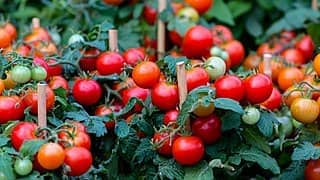
Best Growing Conditions:
- Sun Exposure: full sun
- Soil Acidity: slightly acidic
- Hardiness Zones: 5-8
Cucumber
Cucumber is a vegetable that will give you some options as a gardener and as a chef. These plants come in several varieties, some of which take the form of a vine, while others grow as a small shrub. You will also find that there are some cucumbers that are best for eating and other species that are great for pickling. Either way, make sure that you keep your cucumber plant’s soil moist at all times.
You may also be interested in… Don’t Plant Cucumbers and Tomatoes Together: Here’s Why
Best Growing Conditions:
- Sun Exposure: full sun
- Soil Acidity: acidic
- Hardiness Zones: 4-12
Swiss Chard
Leafy vegetables are some of the best options for container gardens. Within that group, swiss chard stands out as one of the most vigorous choices. Not only will swiss chard grow quickly, but it is also one of the most nutritious vegetables around.
Best Growing Conditions:
- Sun Exposure: full sun to partial shade
- Soil Acidity: slightly acidic
- Hardiness Zones: 6-10
Peppers
Whether you like them spicy or sweet, peppers will make an excellent addition to any container vegetable garden. As you browse, you will find that there are many pepper plants that are easy to grow. Each one will give you a set of tasty peppers and a pop of color in your garden.
Best Growing Conditions:
- Sun Exposure: full sun
- Soil Acidity: acidic
- Hardiness Zones: 9-11
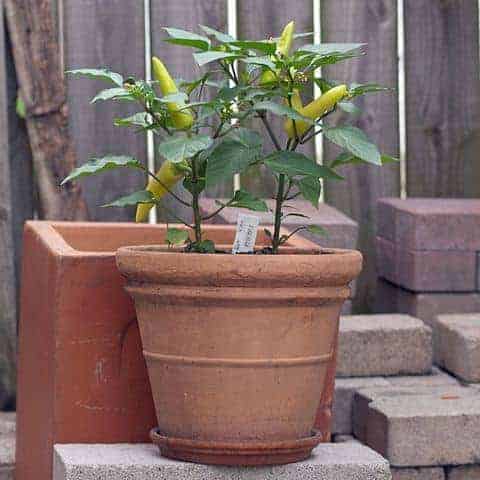
Beets
Beets are not at the top of most people’s lists of favorite vegetables. Nevertheless, they are a relatively low-maintenance vegetable that you should consider for your garden. What makes beets so suitable for containers is that they require very little space to exhibit healthy growth.
Best Growing Conditions:
- Sun Exposure: full sun
- Soil Acidity: slightly acidic to neutral
- Hardiness Zones: 2-10
Radishes
As is the case with beets, radishes also do not require a lot of growing space. The other main advantages of these plants are that they reach a mature size very quickly and both the radish portion and the greens are edible.
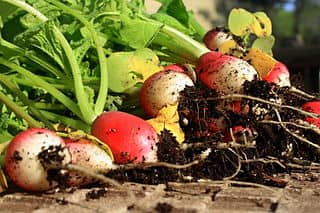
Best Growing Conditions:
- Sun Exposure: full sun
- Soil Acidity: acidic to neutral
- Hardiness Zones: 2-10
Eggplant
Eggplant is another nightshade that is exceptionally easy to grow. However, if you are planting in containers, you should select a smaller eggplant cultivar. Many other varieties will grow too large for a container setting.
Best Growing Conditions:
- Sun Exposure: full sun
- Soil Acidity: acidic to neutral
- Hardiness Zones: 10-11
Onion
There are a few onion varieties that you can grow in containers. Considering how versatile onions are as an ingredient, it is to your benefit to grow some of your own. If you are looking for the easiest onion to grow, green onions will take that prize.
Best Growing Conditions:
- Sun Exposure: full sun
- Soil Acidity: acidic
- Hardiness Zones: 7 and warmer
Green Beans
Green beans are another vegetable that offers you some options. You can choose to cultivate a shrub-like green bean plant or one that grows along a trellis. Along with being a tasty addition to many recipes, green beans will also be an attractive element in your garden.
Best Growing Conditions:
- Sun Exposure: full sun to partial shade
- Soil Acidity: acidic to slightly alkaline
- Hardiness Zones: 2-10
Zucchini
Zucchini is a classic summer vegetable. Thankfully, it is also one that is extremely easy to grow and care for. With minimal effort on your part, these plants will produce a copious number of zucchinis throughout the growing season. They also come in several different varieties, which gives you the chance to grow the one you like best.
Best Growing Conditions:
- Sun Exposure: full sun
- Soil Acidity: acidic
- Hardiness Zones: 3-9
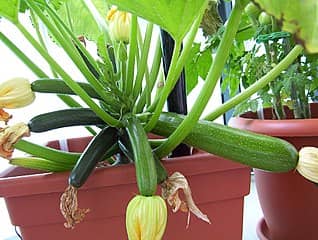
A Few Vegetable Growing Tips
You now know some of the best vegetables to grow in containers. Now it is time to further your preparation by learning a few vegetable growing tips. Read on to find out what it will take to create a healthy container vegetable garden.
You may also be interested in: 7 Easy Steps to Grow Sugar Snap Peas in Containers
Best Potting Soil for Vegetables
The first step in finding the right soil for your vegetables is to know what you are looking for. In a standard garden supply store, you will find many soil and soil-related products. However, many of these options will not be suitable for a container vegetable garden.
Search for products that are potting soils rather than garden soils or any other kind of soil. Unlike those other options, potting soil has unique characteristics that make it perfect for containers. For instance, potting soils allow for great drainage and ventilation.
Other soil products are better suited for plants that grow in the ground. These soil amendments work to improve the quality of the soil that already exists. While these amendments are useful for many garden applications, they are not the right option for a container garden.
Avoid those other items and buy only a high-quality potting soil mix. The best of these soils often contains peat moss or some other form of organic matter that adds nutrients to the mix. Some of these soils also contain fertilizer to stimulate vigorous vegetable growth.
Recommended Potting Soil for Vegetables
| Image | Title | Prime | Buy |
|---|---|---|---|
 | Burpee, 9 Quarts | Premium Organic Potting Natural Soil Mix Food Ideal for Container Garden-Vegetable, Flower & Herb Use for Indoor Outdoor Plant | PrimeEligible | Check Price on Amazon |
 | Miracle-Gro Potting Mix 2 cu. ft. | PrimeEligible | Check Price on Amazon |
Top | FoxFarm Ocean Forest FX14000 -1.5 Cubic Foot Organic Potting Soil | Prime | Check Price on Amazon |
 | Useful Universe Organic Potting Mix Soil for Vegetables, Herbs and Flowers, 8 Quart | PrimeEligible | Check Price on Amazon |
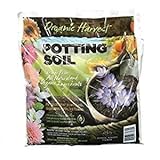 | Organic Harvest Potting Mix Soil for Vegetables, Herbs and Flowers, 4 Quart (Packaging May Vary) (1 Bag) | PrimeEligible | Check Price on Amazon |
 | FoxFarm FX14054 Happy Frog Potting Soil, 12 Quart | Prime | Check Price on Amazon |
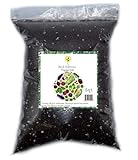 | Potting Soil for Vegetable Plants, Hand Blended 100% All Natural Potting Soil for Growing Vegetables in Containers, Pots or Small Raised Beds 8qt | PrimeEligible | Check Price on Amazon |
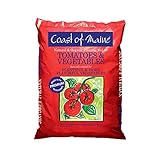 | Coast of Maine OMRI Listed Tomato and Vegetable Plant Potting Soil Compost Blend for Container Gardens and Flower Pots, 20 Quart Bag | Prime | Check Price on Amazon |
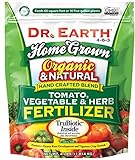 | Dr. Earth Organic 5 Tomato, Vegetable & Herb Fertilizer Poly Bag | PrimeEligible | Check Price on Amazon |
Best Containers to Grow Vegetables in
Just as there are many vegetables you can choose to grow in your container, there are also many different containers for you to choose from. You are likely familiar with some of these common options, such as plastic or clay pots. However, there is an alternative to these traditional containers that may be a better choice.
Fabric grow bags are a fantastic container option for growing vegetables and many other kinds of plants. The materials in these bags give way to numerous positive outcomes for the plants you intend to raise.
First, fabric grow bags are permeable. That feature allows these containers to drain water with great effectiveness while allowing air in to facilitate proper ventilation and air pruning.
Additionally, fabric grow bags typically consist of natural fabric materials. That means that you will not need to worry about any harmful chemicals leeching into your vegetables when using a fabric grow bag.
You may also be interested in: 20 Best Winter Vegetables to Grow in Pots
Recommended Vegetable Growing Containers
| Image | Title | Prime | Buy |
|---|---|---|---|
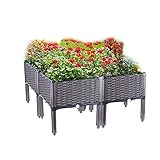 | Raised Garden Bed for Vegetables, 4 Packs | PrimeEligible | Check Price on Amazon |
Top | Self Watering Vegetable Planter Box with Trellis on Wheels - Mobile Garden | Prime | Check Price on Amazon |
 | EMSCO Easy Picker Raised Bed for Vegetables – With 30" Stand, 4 Casters, and Supply Storage Grate – Self-Watering | PrimeEligible | Check Price on Amazon |
 | AXABING 100 Gallon Extra Large Fabric Raised Planting Bed for Vegetables | PrimeEligible | Check Price on Amazon |
 | FOYUEE Galvanized Raised Garden Beds for Vegetables, 8x4x1ft | PrimeEligible | Check Price on Amazon |
 | Mr. Stacky 5 Tier Stackable Strawberry, Herb, Flower, and Vegetable Planter - Vertical Garden Indoor/Outdoor | PrimeEligible | Check Price on Amazon |
Sunlight Needs for Vegetables in Containers
As you may have noticed while reading through our list, most of the vegetables you can grow in containers need ample amounts of daily sunlight. For some vegetables, a partial shade environment will do, but in most cases, full sun is best.
One of the advantages of containers is mobility. So, if you find that your vegetables are not receiving enough sunlight, simply relocate the container in which they grow. Whether you are growing indoors or outdoors, six hours of sunlight is a good benchmark to shoot for with most vegetables.
Watering Vegetables in Containers
We just noted that vegetables tend to need a lot of sunlight. The same is true for water needs. When growing vegetables in containers, make sure that you maintain a consistent level of moisture in the soil.
Check the specific watering needs for each individual vegetable you intend to grow. You may find that many of the plants you consider will need water once or even more than once per day. That need for water will only increase during heatwaves. Make sure you keep up with a regular watering schedule to prevent your vegetables from drying out.
Recommended Watering Systems
| Image | Title | Prime | Buy |
|---|---|---|---|
 | Flantor Garden Irrigation System, 1/4" Tubing Watering Drip Kit Automatic Irrigation Equipment Set | PrimeEligible | Check Price on Amazon |
Top | Rain Bird SWDMSPKIT Drip Irrigation Spot Watering Manifold on a Spike Kit, Bubblers and Emitters | PrimeEligible | Check Price on Amazon |
 | Automatic Watering System with 30-Day Watering Cycle Timer | PrimeEligible | Check Price on Amazon |
 | Orbit 57946 B-hyve Smart 6-Zone Indoor/Outdoor Sprinkler Controller, Compatible with Alexa, 6 Station | PrimeEligible | Check Price on Amazon |
 | Raindrip R560DP Automatic Watering Kit for Container and Hanging Baskets, Water up to 20 plants with this kit , Black | PrimeEligible | Check Price on Amazon |
Fertilizing Vegetables in Containers
Fertilization is another important aspect of growing vegetables. We already mentioned that some potting soils will include fertilization. But even when that is the case, the chances are that you will need to add more fertilizer regularly.
There is no exact frequency for vegetable fertilization. But fertilizing twice each month is often a healthy practice. By maintaining a fertilization habit and following our other maintenance tips, you stand the best chance of cultivating a container garden full of fresh vegetables that are ready for kitchen use.
Recommended Vegetable Garden Fertilizer
| Image | Title | Prime | Buy |
|---|---|---|---|
 | Dr. Earth Organic 5 Tomato, Vegetable & Herb Fertilizer Poly Bag | PrimeEligible | Check Price on Amazon |
 | Miracle-Gro Shake 'N Feed Tomato, Fruit & Vegetable Plant Food, Plant Fertilizer, 4.5 lbs. | PrimeEligible | Check Price on Amazon |
Top | Down to Earth Organic Vegetable Garden Fertilizer 4-4-4, 5lb | PrimeEligible | Check Price on Amazon |
 | Osmocote Smart-Release Plant Food Flower & Vegetable, 8 lb. | PrimeEligible | Check Price on Amazon |
 | Nelson All Vegetable Garden Plant Food Granular Fertilizer NutriStar 12-14-11 (4 LB) | PrimeEligible | Check Price on Amazon |
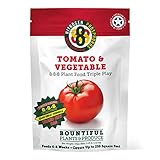 | 8-8-8 Triple Play Tomato & Vegetable Plant Food, Covers 250 sq. ft. | PrimeEligible | Check Price on Amazon |

John Haryasz is a freelance writer and landscape designer. In the field of landscape architecture, he has contributed to many successful design projects throughout the country. As a writer, John specializes in creating captivating and informative web content. Through that work, he aims to share his design knowledge and promote engagement with the outdoor world.
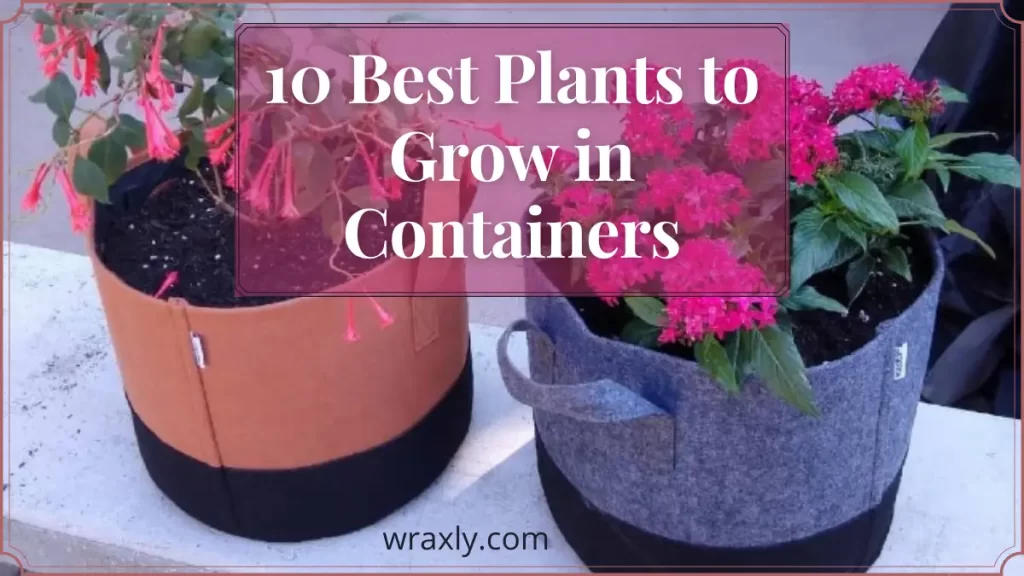
![How to Water Indoor Plants [Plant Care 101]](https://wraxly.com/wp-content/uploads/2021/03/How-to-Water-Indoor-Plants-Plant-Care-101-1200-1024x576.webp)
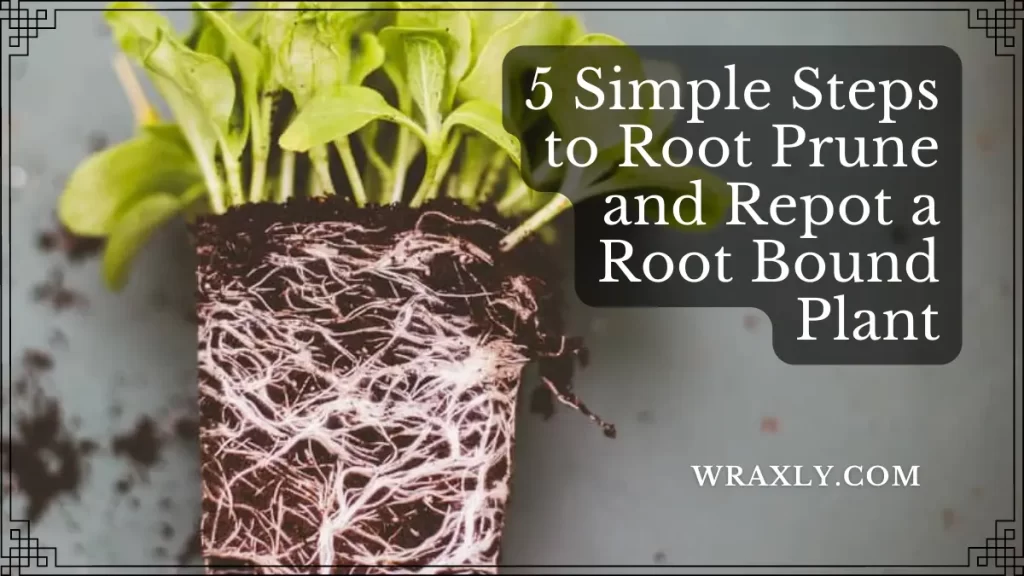
![Growing Plants from Cuttings [A Simple Guide]](https://wraxly.com/wp-content/uploads/2021/03/Growing-Plants-from-Cuttings-A-Simple-Guide-1200-1024x576.webp)
